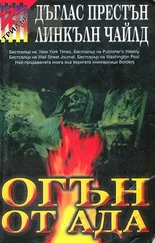Paine nodded, hands clasped. He looked a little ragged, eyes bloodshot, clothes rumpled, hair mussed. Jet lag, maybe? “I want to be as helpful as I can,” he said, in a tone that implied just the opposite.
D’Agosta led him through the preliminary questions about age, residence, how long he’d worked at Sharps & Gund, and so forth, receiving short, uninformative answers. Finally D’Agosta got to the meat of the interview.
“I’d like you to describe for us the Cantucci security system: how it worked, how it was set up, and especially how it was circumvented.”
At this Paine crossed his arms and began to describe the system in general terms, much as Marvin had done earlier. D’Agosta listened, taking a few notes, getting the strong impression as he did so that the guy was holding back. He asked a few probing questions about system details, and got in return more vague answers and evasion, until Paine finally said: “I really can’t answer any more questions of a technical nature.”
“Why not?”
“You must know I’ve signed NDAs about all this and I’m not supposed to talk about it. I could be fired — even sued.”
“Has Ingmar threatened you with retaliation if you talk to us?” D’Agosta asked.
“Not in any specific way, but the general message was clear.”
“Mr. Paine, do you wish to terminate the interview? I want you to understand that if you do, we will get a subpoena, take you down to the station, and you’ll be compelled to answer questions under oath.”
“I realize that.”
“Is that what you want us to do?”
“Yes, in fact. Because then my ass will be covered.”
Son of a bitch. The guy was calling his bluff. D’Agosta leaned forward. “Believe me, we’re going to remember just how helpful you were, and we’re going to return the favor.”
Paine looked back at him, eyes blinking behind large glasses. “So be it. The harder you ride me, the better it’ll look to Ingmar. Look, Lieutenant, I need my job.”
At this Pendergast spoke, his voice mild and honeyed. “So what you require, Mr. Paine, is to be coerced?”
“That’s about it.”
“Since we are short on time, and getting a subpoena will take several days, I wonder if there isn’t a way we can coerce you right here and now.”
Paine stared. “Like how? Is that a threat?”
“Heavens, no! I’m just thinking of creating a little drama. Sergeant Curry, I assume you carry a battering ram in that squad car of yours?”
“Always.”
“Excellent! Here’s what we’ll all do. We’ll leave the house, drive away, then return shortly with sirens blaring. Mr. Paine, you will refuse to open the door. Sergeant Curry, you will enter stage center and batter down the door in a suitably spectacular and destructive fashion, so that all the neighbors will hear. We shall lead Mr. Paine out of the house in handcuffs — after suitably disarranging his clothing and hair and perhaps tearing a few buttons off his shirt in the process — and take him to the station where we can finish the interview. All this without need of a subpoena, because, Mr. Paine, you will agree on video — for the legal purposes of law enforcement, you understand, and it won’t ever get back to your employer — that this was entirely voluntary and you understand your rights and all the rest.”
A silence. Paine looked at D’Agosta, then back at Pendergast. “Who’s going to pay for my door?”
Pendergast smiled. “Consider which will cost more: a new door, or the four-hundred-dollar-an-hour attorney you will need to hire if the lieutenant serves you with a subpoena and takes you downtown for what will be at least a twelve-hour interview, possibly stretching over several days — unless of course you want to take your chances with one of the pro bono hacks supplied by the state.”
A long silence. “Okay,” said Paine, actually breaking into a sort of cynical smile. “This is going to be interesting.”
“Excellent,” said Pendergast rising. “We shall be back. In, say, an hour?”
After the big hullabaloo in Maplewood — all the neighbors, D’Agosta had noticed with a certain gratification, had been plastered to their windows — they had taken Paine down to 1PP and he was now comfortably ensconced in a small conference room, where he had become a most cooperative and friendly witness. The official setting seemed to loosen his tongue, and he had gone into great technical detail about the Cantucci system. They were now moving on to Sharps & Gund itself.
“I was the senior man on the Cantucci install,” Paine was saying. “A lot of the people I have to deal with are difficult, but Cantucci was a royal pain in the ass. There was a lot of stuff he didn’t like — cosmetic stuff, mostly, such as the placement of cameras or the color of the CCTV monitors — and he just about nitpicked us to death. He was the kind of guy who didn’t want to sully himself by dealing with the low-level people like myself. He always took his complaints right to Mr. Ingmar, every little thing. It drove Ingmar crazy that Cantucci would only talk to him, calling him up at all hours of the day and night and treating him like his lapdog. Ingmar really came to hate him, and even talked about firing him as a client, except that the man owed us a lot of money. They had a shouting match once, on the phone.”
“What about?” D’Agosta asked.
“Money. Cantucci wasn’t paying the bills. Said he wouldn’t pay a dime until the install was completed to his satisfaction.”
“And did he pay in the end?”
“Not totally. He chiseled Ingmar over the final bill, finding fault with every little thing and deducting for it. I think we got about eighty cents on the dollar. I’m pretty sure Ingmar took a loss on the job.”
“What was the total?”
Paine thought for a moment. “I’d guess around two hundred. Plus a monthly fee of two grand.”
D’Agosta shifted position, consulted his notes. He was now getting to the heart of his questions. “Would Ingmar have been capable — did he personally have the knowledge — to bypass the security system the way the killer did?”
“Yes. Absolutely.”
“Who else at Sharps and Gund would have sufficient skills to do what the killer did, in circumventing the system?”
“My install partner, Lasher. Possibly the guy who heads the IT department, maybe the chief of programming and design. But I really don’t think either of them knew how the Cantucci system itself was laid out or had access to the technical lockbox.” He paused, considering. “Really, Ingmar and Lasher are probably the only two, other than me of course.”
This is good , D’Agosta thought. Really good. “You and Lasher were the techs who responded to and performed the repair that had apparently been rigged, staged for by the killer?”
“I was the guy, but Lasher had been fired by that time, so I went with another techie.”
“Which is?”
“Hallie Iyer. She still works for the company.”
“Would this Ms. Iyer have enough knowledge to circumvent the system?”
“No. No way. She’s pretty junior in the firm, hasn’t been with it more than a couple of months.”
“Tell us about your ex-partner, Lasher,” said D’Agosta. “The one who helped you with the original install. What kind of guy was he?”
“He was a strange one. Man, he gave me the creeps — not from day one, though. It came on kind of gradually. At first he was really closemouthed, didn’t say a word, but as we worked together more he sort of let down his guard. Oh, I can see why Ingmar hired him — he knew his stuff, no doubt about that — but he talked some strange shit.”
Читать дальше
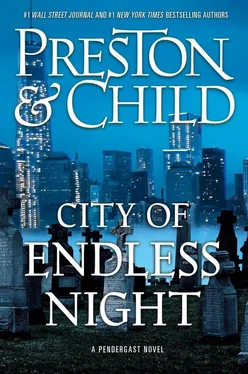


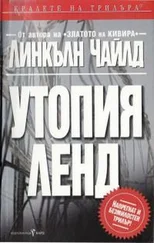


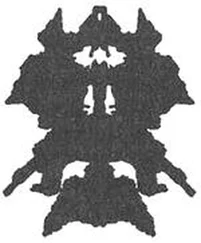


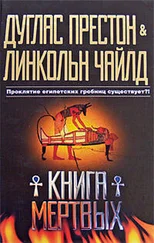
![Линкольн Чайлд - Стихи для мертвецов [litres]](/books/396536/linkoln-chajld-stihi-dlya-mertvecov-litres-thumb.webp)
